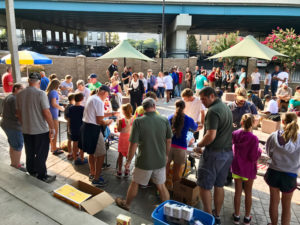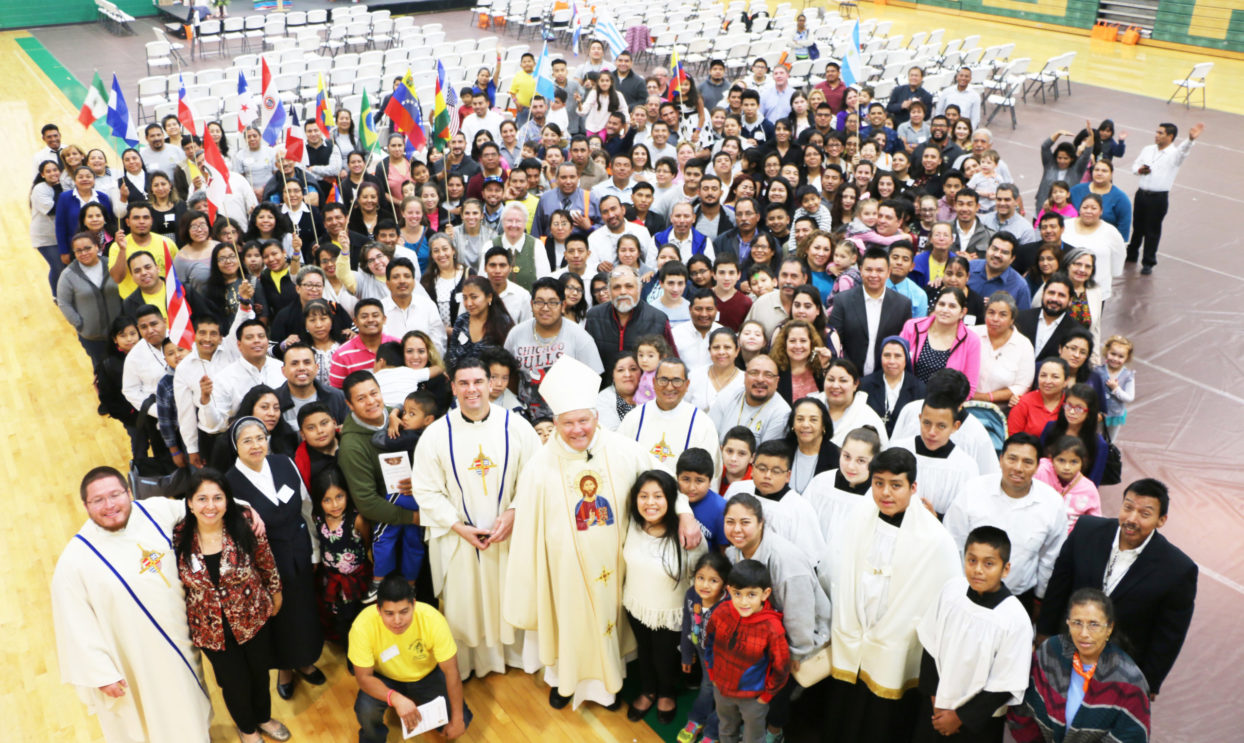Chancellor calls process ‘inspiring and illuminating’ as local document heads to Rome
By Jim Wogan
When Pope Francis laid out his plan for the upcoming Church Synod, Deacon Sean Smith knew it eventually would come to this.
Collecting the thoughts and opinions of more than 1.2 billion Catholics around the world sounded like an admirable and historic ambition. But in practice, the process was going to be a challenge for individual dioceses and Deacon Smith knew it.
Despite that, and under Deacon Smith’s direction, the Diocese of Knoxville fulfilled the mandate it received from the Holy Father last year. On May 7, Deacon Smith forwarded to the U.S. Conference of Catholic Bishops the official diocesan synthesis for Synodus Episcoporum, Synod 2021-2023.
With that, the deacon, who also serves as chancellor of the Diocese of Knoxville, took a deep breath, smiled, and reflected on what had just happened.
“This was an inspiring and illuminating process. Yes, it was filled with its share of logistical challenges,” Deacon Smith said. “But thanks to the help I received from my colleagues Lisa Healy, Deacon Scott Maentz, and John Steger, and from all of our parish group leaders, our diocesan Synod team members, our pastors, school leaders, ministry directors, and the faithful, I am pleased to say that the mission given to us by Pope Francis has been fulfilled.”

Diocese of Knoxville parishioners volunteer for the Bridge Ministry, which provides meals and personal-care items for Knoxville’s homeless community.
Deacon Smith and Mrs. Healy were appointed by Bishop Richard F. Stika in September 2021 to lead the diocesan Synod effort. They quickly assembled a diocesan Synod team that was composed of 26 members and reflected the diversity of the Catholic Church in East Tennessee. The team helped formulate an online survey to be used by parishes, schools, and ministries.
A second survey was designed for non-Catholics, and a third survey was developed for people who lived on the margins of society—primarily the homeless.
“We did our best to reach everyone,” Deacon Smith said.
The most daunting part of the process was compiling thousands of pages of raw data Deacon Smith received from the online diocesan survey, and reports from townhall-style listening sessions held at locations around the diocese—and then synthesizing the results into a concise 10-page summary for the USCCB.
Feedback from the Diocese of Knoxville will be used to help the bishops conference formulate its own report, which eventually will find its way to Rome for the Synod of Bishops to take place in 2023.
The survey, completed by 4,693 people, and listening sessions held at parishes, schools, and ministries across the diocese, addressed several issues facing the Church and allowed respondents to add thoughts on other topics they deemed important.
Among other things, the diocesan report covered the following topics:
- Journeying together: More than 75 percent of the respondents feel that their parish/school/organization works well journeying together (synodality) and offers activities and ways to feel welcomed and involved in their community of faith. Over 85 percent feel their parish/school/organization attracts and welcomes newcomers.
Many of the respondents feel their local church leaves certain groups on the margins. Specifically, 39 percent feel the LGBTQ+ community is not well served, while 29 percent feel the Church could do a better job serving the homeless.
- Living the faith: 81 percent of the respondents say they attend Mass every Sunday, while 16 percent attend Mass one to three times a month; 2 percent never attend Mass and 1 percent only attend on Christmas and Easter; 15 percent attend Mass daily; 94 percent believe in the Real Presence of Jesus Christ in the Eucharist, with 2 percent not believing and 4 percent saying they are unsure; 84 percent of the respondents feel the Eucharist is the source and summit of their Catholic life while 8 percent disagree, and 8 percent are unsure.
- Immigration: The belief that one of the Church’s missions is to receive and welcome with love and respect people from outside the United States was shared by 86 percent of the participants, with 6 percent disagreeing and 8 percent not sure.
Among the reasons given for immigrants being allowed to come to the United States, 76 percent feel they should only be allowed to enter/remain if they comply with the laws of the United States, 65 percent if they are fleeing war/persecution/national disasters, 62 percent for work, 61 percent for study, and 57 percent for reunification of family. Sixty-five percent of the respondents feel unaccompanied minors, children who have grown up in the United States, and people arriving because of human trafficking should be allowed to remain in the country and pursue a pathway to citizenship, while 16 percent disagree, and 19 percent are unsure.
- Celibacy and ordination: The issue of clergy came up routinely in the parish listening sessions and was a component of the online surveys. Fifty-five percent of participants feel that in certain circumstances or in certain parts of the world where celibate men are in short supply and access to Mass is extremely limited the ordination of married men should be considered. Twenty-eight percent of the respondents disagree, and 18 percent are unsure. Forty-nine percent of the respondents are in favor of women being ordained permanent deacons, while 37 percent disagree, and 14 percent are unsure.
Additionally, although not in a clerical perspective, 92 percent of the respondents believe the role of women in the life and mission of the Church is necessary and irreplaceable.
- Same-sex attractions: An overwhelming majority of the respondents, 90 percent, feel that men and women with homosexual tendencies should be accepted with respect, compassion, and sensitivity and that every sign of unjust discrimination against them should be avoided.
Ten percent disagree or are unsure. Fifty-six percent of the respondents feel homosexual acts are acts of grave depravity, intrinsically disordered, and are contrary to natural law, with 34 percent disagreeing and 10 percent unsure.
- Sacredness of human life: An overwhelming majority, 88 percent of the respondents, feel that human life must be respected and protected from the moment of conception and must be recognized as having the rights of a person. Five percent disagree and 6 percent are unsure.
The same 88 percent feel that the embryo is a person and must be defended in its integrity and tended and cared for in the same way as any other human being. Five percent disagree and 7 percent are unsure.
- Non-Catholic results: A total of 256 people completed the non-Catholic survey. Sixty-five percent feel the Catholic Church welcomes non-Catholics to attend Mass and to get involved in their community of faith.
The response of non-Catholics reflected views not always consistent with Catholic teaching. Only 8 percent of non-Catholics feel that Catholic married couples should not use contraception. Eighty-four percent of non-Catholic respondents disagree with Catholic teaching on the use of contraception and 8 percent are unsure. Seventy-seven percent of non-Catholic respondents feel that in vitro fertilization should be allowed for Catholic couples who experience infertility.
- Homeless results: A total of 27 people completed the homeless survey of which 52 percent feel the Catholic Church welcomes the homeless to attend Mass as they are, while 30 percent said “sometimes,” and 19 percent said the Church is not welcoming. Thirty-seven percent of the homeless respondents feel comfortable asking the Catholic Church for help.
Unfortunately, 44 percent said they do not feel comfortable, and 19 percent are unsure. Only 23 percent of the homeless respondents feel that the Catholic Church is actively involved in helping people who are experiencing homelessness. Thirty-five percent indicate that the Church helps them “sometimes,” and 42 percent feel the Church never helps them.
- Abuse scandal: Among its final conclusions, the report to the USCCB indicated that many parishioners in the Diocese of Knoxville feel broken and scandalized by the way the Church has handled clergy abuse—“both sexually and through the abuse of power.”
The diocesan report concluded that a forceful statement from the Church needs to state that “scandals within the Church will no longer be tolerated and will be dealt with swiftly. Clericalism in its negative connotations should be a thing of the past,” the diocesan report said.
- Additional conclusions: “We need to recognize the heroic contributions of the laity, both men and women, as well as our priests,” the report said. “We found that many did not understand and disagreed with the moral teachings of the Church, such as those relating to marriage, contraception, in vitro fertilization, and acceptance of people with different sexual orientation.
“There was a sentiment that the Church should be less judgmental and more pastoral to the LGBTQ+ community. Additionally, there was a significant number of respondents who felt the annulment process was too lengthy and difficult.”
The report also addressed the current social and political climate in the country and how it is impacting the faithful.
“We found an equal division of opinion that the Church was involved in politically motivated issues too much or too little,” the report said. Examples cited include COVID policies, policies regarding border security and the treatment of migrants, and Holy Communion for prominent political figures who support abortion.
The report’s conclusion also touched on awareness of Church teaching and catechesis.
“From our surveys and listening sessions, it was clear there was a poor understanding of the Church’s moral teachings and disciplines,” the report said. “We found a general lack of knowledge and understanding concerning the teachings of the Church in many areas, especially those related to the Eucharist and Catholic social teachings.
“There is an ongoing and growing need for catechesis for adults as well as children on both the diocesan and local parish levels. In the opinion of some, general improvement of Catholic education for children was the suggested answer to this lack of education. The survey and listening sessions tell us that adult faith formation is as much needed as catechesis of youth,” the report added.
“While the survey and listening sessions may have shown areas in which we do not understand, agree with, or support the teaching of the Church, like the journeying disciples on the road to Emmaus, we recognize Christ among us and have as our biggest takeaway a renewed desire to work together to solve those problems that were presented and to continue the synodal process of always maintaining a spirit of communion, participation, and mission!
“May what the Holy Spirit intended in placing the Synod 2021-23 in Pope Francis’ heart be done as it was in the womb and heart of our Blessed Mother Mary when the angel spoke to her,” the report continued.
The full report can be found online at dioknox.org.

